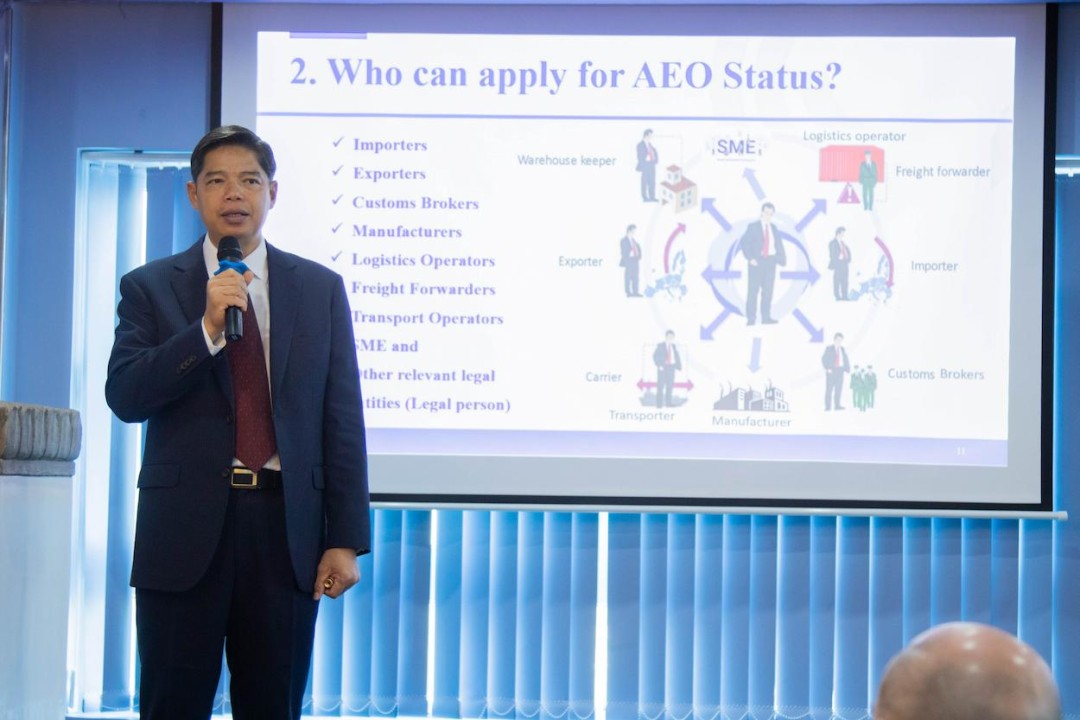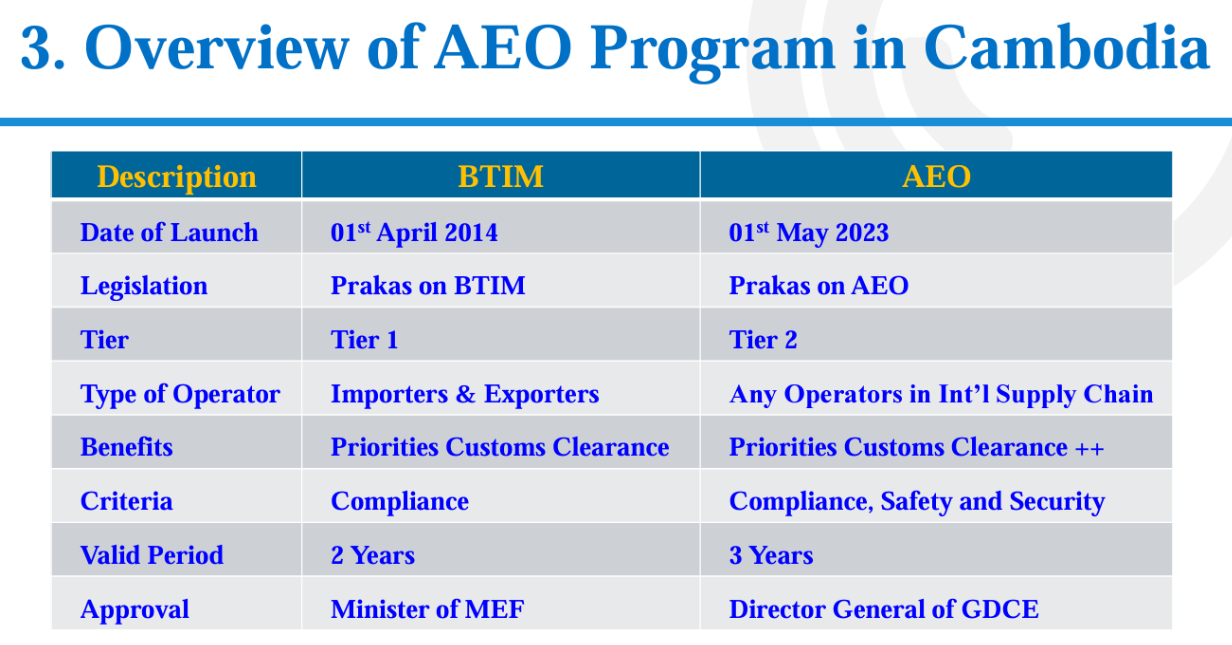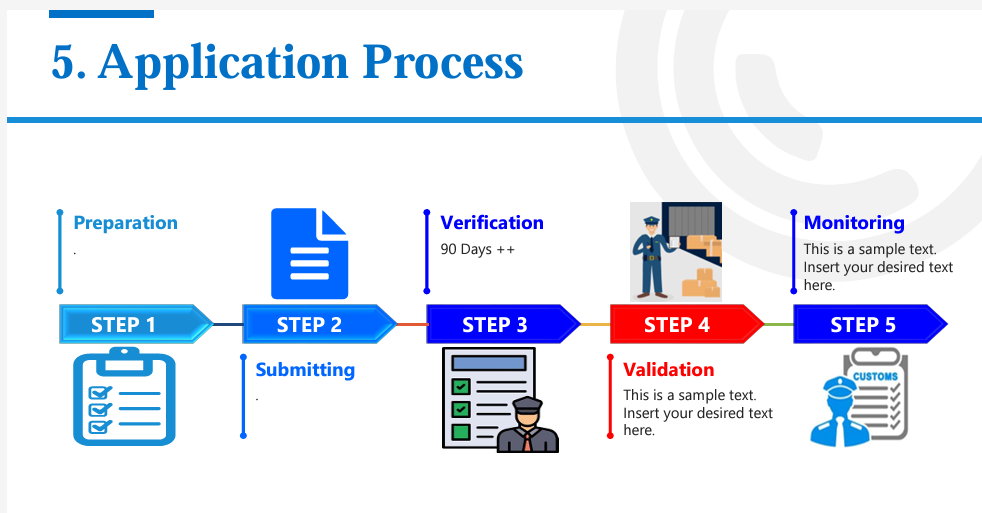Obtaining Authorised Economic Operator (AEO) Certification In Cambodia

The American Chamber of Commerce (AmCham) in Cambodia hosted a workshop on how to obtain Authorised Economic Operator (AEO) certification at CamEd Business School on October 9, 2024.
Based on a presentation delivered by Bou Bunnara, Director of the Legal Affairs and Public Relations Department at the General Department of Customs and Excise (GDCE), we explore what an AEO is, along with its benefits, criteria, and application.
What Is an Authorised Economic Operator (AEO)?
An Authorised Economic Operator (AEO) is defined by the World Customs Organisation (WCO) as “a party involved in the international movement of goods in whatever function that has been approved by or on behalf of a national Customs Administration as complying with WCO or equivalent supply chain security standards.”
AEO status is considered equivalent to that of the Customs Trade Partnership Against Terrorism (CTPAT) program established by the U.S. Customs and Border Protection agency, as well as a cornerstone of the WCO’s SAFE Framework of Standards.
In Cambodia, the AEO framework is fully compliant with World Trade Organisation (WTO) and WCO guidelines.
Types Of AEO Authorisation
There are two main types of AEO authorisation in the world:
- AEO - Customs Simplifications (AEOC)
- AEO - Security and Safety (AEOS)
In Cambodia, Bunnara shared that AEO development can be categorised into two tiers. The first tier is the Best Trader Incentive Mechanism (BTIM), established in 2014, which operates similarly to AEOC.
The second tier is the Authorised Economic Operator (AEO), equivalent to the AEOS standard.
Comparison: BTIM vs. AEO

Who Can Apply For Authorised Economic Operator Certification?
According to Bunnara, the AEO program is a voluntary, application-based, and free-of-charge initiative offered by the GDCE. Entities involved in the international movement of goods, or those that deal with the GDCE, can apply, including:
- Importers
- Exporters
- Customs Brokers
- Manufacturers
- Logistics Operators
- Freight Forwarders
- Transport Operators
- SMEs
- Other relevant legal entities (legal persons)
Benefits Of Having AEO Certification
The BTIM certificate offered by the GDCE focuses on simplifying and prioritising customs clearance, while the AEO certificate provides additional advantages, including:
- Destination Clearance: Applicable to customs bonded warehouses, temporary storage, or company premises.
- Use of AEO Logo: A GDCE-designated logo for AEOs.
- Assignment of Customs Officer
- Deferred Payment: Clear goods before settling customs duties within a specified period.
- Mutual Recognition Agreements (MRA): AEOs benefit similarly to those in Cambodia, particularly from agreements with other countries.
Additional exemptions per the Ministry of Economy and Finance’s sub-decree include:
- Advance verification procedures for valuation, classification, or origin.
- No need for a goods transport permit with cargo.
- Completion of customs clearance before goods arrive.
- Exemption from container scanning, unless required by GDCE risk management.
- Reduced physical inspections based on risk management principles.
- Document deferment for import, export, and transit without security guarantees.
Read GDCE’s Prakas on Authorised Economic Operator Program.
Criteria To Apply For AEO Certification
Companies applying for AEO status must demonstrate:
- Compliance with Customs Requirements
- Satisfactory System for Management of Commercial Records
- Financial Viability
- Evidence of Consultation, Cooperation, and Communication
- Evidence of Education, Training, and Threat Awareness
- Compliant Information Exchange, Access, and Confidentiality
- Evidence of Cargo Security, Conveyance Security and Premises Security, Personnel Security and Trading Partner Security
- Compliant Crisis Management and Incident Recovery
- Compliant Measurement, Analyses, and Improvement
Application Process For AEO Certification In Cambodia
The graph below demonstrates the application process for AEO certification:

Authorised Economic Operator At The Regional Level
In September 2023, six ASEAN member states (AMS) signed a Mutual Recognition Arrangement (MRA) for their respective AEO Programs. The ASEAN AEO MRA (AAMRA) aims to provide a predictable and transparent trading environment among the ASEAN member states.
Based on this agreement, certified AMS AEOs will enjoy faster cargo clearance and priority treatment for cargo inspection of goods traded within the ASEAN region. These benefits are expected to increase savings arising from improved predictability of cargo movement.
The six AMS involved in the implementation of the AAMRA 2023 pilot program included Brunei Darussalam, Indonesia, Malaysia, the Philippines, Thailand, and Singapore. The remaining four AMS are expected to commence during the second pilot implementation in 2024.
As of October 2024, there are three AEO-certified companies in Cambodia (Minebea, Huawei Technologies, and GGEAR) and 51 BTIM-certified companies.